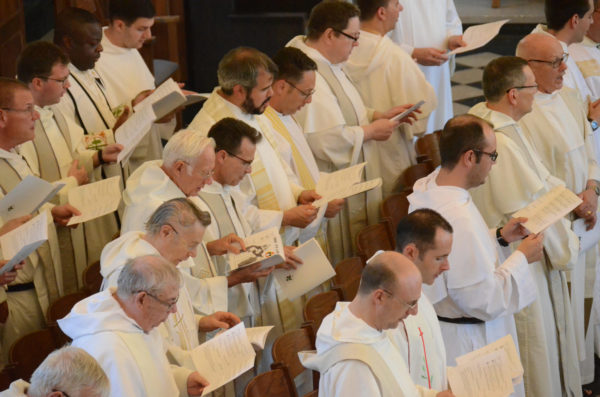|
In 1216, St Dominic founded the Order of Preachers to preach for the salvation of souls. To carry out the mission, Dominic created an Order composed of various components. He first organized the contemplative nuns, next the friars. Shortly thereafter, lay people began to embrace the charism and mission of the Order. Groups of women also contributed as consecrated religious to the holy preaching in a wide variety of apostolic ways. From the beginning, St Dominic founded a non-ordained presence among the friars. For centuries they were called lay brothers or conversi. Since 1958, the non-ordained friars have been called cooperator brothers. Much has been discussed about the decline in vocations to the religious life. In the West – the United States, Canada, and Western Europe – the problem is even more acute Right before our eyes, religious life is disappearing. The amount of men responding to the call of religious life or priesthood is in steep decline and among the non-ordained men, often called brothers, the decline is even more severe. These trends are consistent with what is happening within the Dominican Order. Even more decline will occur in the next few years. Why are so few men responding to God’s call to live their lives as consecrated religious brothers?
#1. Modern secular society does not value appropriately life in community and family. People are searching for meaning and ways to be brought together in authentic relationships. Yet, for the most part, modern secular society has no clue what this means. People are searching for sanctification, yet community and family values are foreign to many today. The notion of joining a religious community for prayer, friendship, common values, support, common ministry, appropriate intimacy, and ultimately sanctification is outside the mindset of most people in today’s world. #2. People both inside and outside the Church are confused about the meaning of the ordained priesthood. Lack of clarity exists about Jesus’ institution of the priesthood and the guiding authority of the Holy Spirit in the Church. When some hold that the fact that only certain men are called to be priest is an equality issue, they are missing the meaning of ordination. This directly affects people’s views about the brothers. We are not all called to the same vocation. We have all been given different gifts and charisms in order to carry out our unique vocation. For those who are called to be non-ordained religious, “going all the way” means that their vows before God, Church, and their religious community is the fulfillment of that call. #3. Many in religious life have forgotten the zeal and observances necessary to live fully the life to which we are called. It’s easy to forget the Cross and the life of sacrifice we are called to make. A watered-down approach to religious life does not attract young people. It speaks little of radically living our lives in complete discipleship of Jesus. #4. There is confusion about, ‘who we are,’ versus ‘what we do.’ In today’s society, we often focus exclusively on what we do. In conversations we often first ask, “what do you do?” We define ourselves by our function, by our career, by our status. The gospel says no to this way of thinking. Who we are, as followers of Christ and children of God, is primary. Even within religious life, I see people define themselves over and over by their ministry – by what they do. What we do is important, but it is not primary. Being a person of prayer, living out the evangelical counsels, working to become a saint, living out our charisms and gifts from God — these go first. These should be how we define ourselves. If we take care of who we are first, our ministry and what we do will be blessed by the Holy Spirit and will bear much fruit. Read Part II of II here.
0 Comments
Leave a Reply. |
Details
Dominican Friars of St. Louis, MOThe Dominican Friars living at St. Dominic Priory in St. Louis, MO are members of both the Central U.S. Province and the Southern U.S. Province. Our student friars go through their formation together at the St. Louis Studium, otherwise known as the House of Studies. Archives
January 2020
Categories |

 RSS Feed
RSS Feed